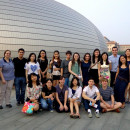Learn Mandarin the Ivy League Way w/out being in the Ivy League! Past Review
By Katie L (East Asian Studies & Creative Writing, Brandeis University) - abroad from 06/20/2014 to 08/15/2014 with
Princeton University: Beijing - Princeton in Beijing, Summer
Although I really enjoyed PiB, it did not make a big personal impact on me. My language skills improved, which was the main reason I went, and it was also nice to return to the area I lived in for nine months during my senior year of high school. Honestly, I think students should go to China, Beijing or otherwise, before participating in PiB. A study abroad program would be more useful than just fun traveling, but either way, previous experience in "the middle kingdom" would make your time at PiB much much better. PiB advertises itself as an intense language program, so students should not expect to have a lot of time in Beijing to explore and experience cultural as well as daily societal activities. If you're reading this and thinking, "well, I wanna go to PiB, but this'll be my first time to China, should I go?" The answer is yes, you should go, and you should be excited. But the truth is that it's going to be hard sometimes; it's your summer and you're studying almost nonstop! But this program is worthwhile, and honestly, part of understanding China and her culture is understanding her language. So get pumped Mandarin language learners, this program wants YOU!
Review Photos


Personal Information
| How much international exposure did you have prior to this program? | 6 months+ |
Review Your Program
|
* Overall educational experience
Academic rigor, intensity, resources, etc. |
PiB is a program that cannot be taken lightly, nor is for the faint of heart. If you are looking for an intensive Mandarin language program that will not interfere with other school work, you are in the right place. Class four hours a day, tests every Friday, plus individual sessions every afternoon Monday through Thursday. You get the weekend to rest, prepare for next week, and complete Monday's assignment. No matter what level of Chinese you are placed in, your Mandarin language abilities WILL IMPROVE. However, even though I was a 3rd year, I must tell you that 2nd year is a completely different animal. THEY WILL TEAR YOU DOWN. The point of 2nd year is to pound the basics into your heads, and to CONSTANTLY correct everything and anything you do. It will be tough, you might want to quit, but if you keep telling yourself that you are good at Chinese, and love learning the language, PiB 2nd year is a great place to realign and readjust your previously set Mandarin language foundations. Sometimes class content will border on the lines of politically incorrect, strange, and nonsensical, but the Princeton program has some of the best methods for teaching Mandarin. *Remember, once your sign the language pledge, you are expected to ONLY SPEAK MANDARIN. If you speak English or are caught speaking another language in class, to a PiB classmate, or on campus, you will face consequences. If you have problems speaking Chinese, as I did before going to PiB, get excited to be a part of this program. Their methods, although harsh at times, will raise your confidence and language levels. |
|
* Host Country Program Administration
On-site administration of your program |
Office staff and teachers are awesome and helpful no matter what problems you may have. Also, if there is an emergency, you will not be penalized for speaking English. The administration understands that this is a first time for a lot of people to be in China. |
|
* Housing:
How satisfied were you with your living arrangements? |
International dorms on the Beijing Normal University campus are NICE. Believe it or not, you get many amenities that local students will never have: private bathroom and shower, A/C, a TV, one roommate, etc. HOWEVER, Xinsonggongyu has rules and policies it needs to enforce, so be conscientious of your actions, respect housekeeping, and enjoy the conveniences of the best dorm on campus :) |
| * Food: |
EXPLORE. YOUR. EATING. OPTIONS. There are a TON of restaurants in the area, so just because McDonalds is basically right behind the dorm, does not mean you should be lazy or scared to go out and find new places. If you have had authentic Chinese food, you know that you will miss it once you leave China, so take the opportunity to travel to all sides of campus and see what restaurants are outside the campus gates. Yes, you should try the cafeteria, HOWEVER, you might as well eat off campus because it's just as convenient, just as cheap, a lot healthier, and LESS CROWDED. One thing most people enjoy about PiB are the weekly Chinese Language Tables, where it's you, a teacher, and one or two other classmates from your level go out to eat lunch and/or dinner twice a week, at the restaurant of your group's choosing. 50 kuai per person, and you have about two hours before you need to head back for individual sessions if you decide on lunch. |
|
* Social & Cultural Integration:
How integrated did you feel with the local culture? |
If you decide to be a part of PiB, do NOT expect social and cultural integration. You will only have the weekends to go out, and there is a break of three days between first and second semester for you to travel. Yes, you will learn about Chinese society and culture in class, but you will not have a lot of time to experience it. |
|
* Health Care:
How well were health issues addressed during the program? |
I did not have a healthcare experience this summer with PiB, but because you are a foreigner and the office staff knows how to work the system, you will be able to receive good medical attention. There are vaccines you need to receive, but PiB is great at preparing you before you leave the States to head to China. |
| * Safety: |
I have always felt safe in Beijing no matter what time of day, but you need to be mindful of your surroundings just like you would be in any other major city. There are thieves, and if your bag does get stolen, do not chase the thief. I have been told that they work in groups, and that they can be armed with knives. Not trying to scare you, but just be smart when you are traveling around, especially if you are by yourself. |
| If you could do it all over again would you choose the same program? |
Yes
|
Finances
|
* Money: How easily were you able to live on a student's budget?
(1 = not very easy/$200+ on food & personal expenses/week, 2.5 = $100/week, 5 = very easily/minimal cost) |
My personal budget for the entire time I was in China was 1000 USD, meaning every week the most I could spend was 125 USD, which is about 770 kuai give or take. Every week will be different depending on where you go and what you eat, but I was able to stay within my budget for the entirety of the program (I even had some money left over, about 50 to 60 dollars). If you constantly go to "foreign" restaurants, or areas that are geared towards foreigners, you will need more than 1000 dollars for the summer. |
| Not including program expenses, about how much money did you spend on food and other expenses each week? | 100 to 120 dollars (614 to 737 kuai) |
| Do you have any general money-saving tips for future study abroad participants? | 1. Always keep an eye on your bank account. There are fees when you withdraw from ATMs, so find out if your American bank has a partner bank in China (sometimes they will waive fees). 2. Be familiar with the conversion rate so that when you withdraw money you know how much you have left or you don't overdraw. 3. THINK OF KUAI AS USD. Don't fall into that trap of "but it's only 3 bucks." You will waste money and people will take advantage of you if you constantly think everything is super cheap. |
Language
| * Did your program have a foreign language component? | Yes |
|
How much did the program encourage you to use the language?
0 = No encouragement, 5 = frequent encouragement to use the language |
The only time you were allowed to use another language was if you were talking to people from home that can't speak Chinese, if you met someone in China that did not know Chinese, or if you were in an emergency situation. |
| How would you rate your language skills at the beginning of the program? | Intermediate |
| How would you rate your language skills at the end of the program? | Advanced |
| What was the highest level language course you had completed prior to departure? | Chinese 105B: Advanced Conversation and Composition II |
| How many hours per day did you use the language? | 10+ |
| Do you have any tips/advice on the best ways to practice the language for future study abroad participants? | Practice writing by hand before you leave; you are only allowed to use the computer for homework. Also work on character recognition. Download Pleco (Chinese-English dictionary) for your iOS or Android device; very handy when traveling around Beijing and in class. |
Other Program Information
|
* Where did you live?
Select all that apply |
|
|
* Who did you live with?
Select all that apply |
|
|
* Who did you take classes with?
Select all that apply |
|
A Look Back
| * What did you like most about the program? |
|
| * What could be improved? |
|
| * What do you know now that you wish you knew before going on this program? | I felt I was prepared before I left for PiB. A friend of mine had gone the summer before, so I asked her a lot of questions. I also read over PiB's site and pre-departure materials, so I knew what to expect before heading over. It also helped a lot that I was familiar with the area and had friends there that I could contact and rely on if I had any problems or questions. |
Reasons For Studying Abroad
| To help future students find programs attended by like-minded individuals, please choose the profile that most closely represents you. |
The Academic or LinguistYou went abroad with specific academic goals in mind; the program credentials and rigor of your coursework abroad were very important to you. You had a great time abroad, but never lost sight of your studies and (if applicable) were diligent with your foreign language study. Good for you! |








